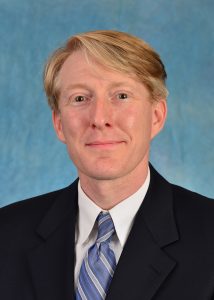Paul Michael Armistead MD, PhD, an associate professor of medicine and the associate chief of basic and translational research in the Division of Hematology is the new Director of UNC’s Bone Marrow Transplant and Cellular Therapy Program.

Dr. Armistead came to North Carolina from Britain in 1985. He enrolled as an undergraduate at UNC Chapel Hill in 1991 receiving the prestigious Morehead Cain Scholarship and stayed until he received his Ph.D. in Chemistry in 2002. After he went for training up at Brigham and Women’s Hospital in Boston and M.D. Anderson Cancer Center in Houston.
But his passion to help heal the people of North Carolina remained strong. He came back to conduct research on cancer antigens and immunotherapies as well as join the Bone Marrow Transplant and Cellular Therapy Program, of which he has been affiliated with for the past 13 years.
The Bone Marrow Transplant and Cellular Therapy Program was created from the ground up by Thomas C. Shea, MD, a hematologist-oncologist, in 1992 to offer bone marrow and stem cell transplant services to people in North Carolina who had advanced blood cancers like leukemia, lymphoma, and multiple myeloma.
Dr. Shea nurtured the program for 25 years before handing it off to Marcie Riches, MD, MS, who ran it for two years. Since Dr. Riches departure, Jonathan Serody, MD, has been the interim director.
“Armistead is a very thoughtful clinician and an extremely talented researcher,” said Serody. “He’s really interested in taking things they develop in the laboratory to patients. I think there was unanimity for his selection to lead the program across every group that we looked at in terms of his leadership skills, his empathy, and his ability to work with people.”
Armistead’s arrival as a new director coincides with a new and exciting time for the program.
In recent years, the program has evolved to include more diverse cellular therapies. One of which is called CAR-T cell immunotherapy. In contrast to chemotherapy, which kills cancer cells while also harming healthy cells, CAR-T cell therapy involves infusing genetically engineered cells that can target and kill cancer cells. The relatively new procedure is gaining traction across UNC for the treatment of leukemia, lymphoma, and myeloma patients.
CAR-T cell therapies are evolving as well. The program is organizing CAR-T clinical trials for conditions other than advanced blood cancers, such as brain tumors, breast cancer, melanoma, and ovarian cancer. This opportunity has allowed the program to expand even further, as CAR-T cell researchers will be able to work with medical and neurooncologists, as well as other specialists.
Armistead hopes that by engaging in these exchanges, oncologists would be able to advance their knowledge of administering cell therapies and better serve patients with these other cancers.
“I’m excited that our program is changing,” said Armistead. “We’re going to start offering more therapies to more people who have different kinds of diseases. If new and better treatments come along, our program needs to be able to adjust and implement these therapies for increasingly diverse patient populations. It would be great to have UNC be a flagship institution for these kinds of therapies.”
But that’s not all. Armistead expects that genetic therapies for diseases such as sickle cell will also be increasing used in the next few years. In this process, cells are taken from a sickle cell anemia patient. Then, hematopoietic stem cells are genetically altered to correct the sickle cell mutation before being reinfused back into the patient’s body.
“To think about curing people of sickle cell anemia is revolutionary, particularly when you think about the number of patients in this state with sickle cell anemia and the degree of suffering that this disease carries,” said Armistead.
– Written by Kendall Daniels